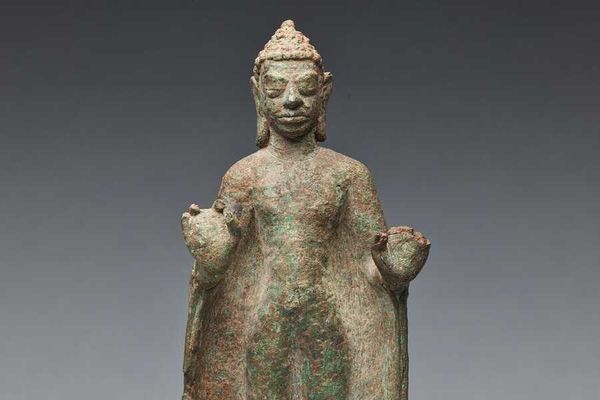UPDATE: Another resignation has been tendered to the beleaguered SF Arts Commission by René Bihan, a Managing Principal Architect with SWA Group, a local design firm in San Francisco.
Bihan has served as a volunteer Arts Commissioner since April 2008. His resignation is based upon various business-related reasons and was not spurred on by the below-discussed Daly Debacle.
However because of said-debacle, Bihan has chosen to remain until his replacement is appointed and confirmed in order to maintain the Commission's crucial voting quorum.
Luis Cancel, Director of Cultural Affairs at the SFAC, checks in with the following statement:
"René Bihan has tendered his resignation, but has offered to continue his work until we find a replacement. This generous gesture will enable the Civic Design Review Committee, on which he serves, to maintain quorum, so that projects can move forward. We are immensely grateful for all of René's efforts, especially on behalf of the Civic Design Committee, and we are sorry to see him go. We are currently working with the Mayor's Office on filling the vacancies."
***************************************************************************************
Like many tales told about San Francisco politics, this one is also slightly convoluted and complex. But one thing is for sure: Due to a recent change effected by Supervisor Chris Daly, former Chairman of the Rules Committee, public art in San Francisco will now suffer.
Seems it's just not enough for Daly to be joining the moneyed ranks of Landlord and Property Owner (of multiple, multi-county homes -- three, at last count).
Nope. Seems he’s determined to punish deep-pocked donors -- or the spouses of his presumed political enemies -- who, when called upon by the Mayor, volunteer their time to serve The City as commissioners.
Daly’s recent line of attack? Members of the, seemingly innocuous, San Francisco Arts Commission.
(Note: Supervisor Daly did not return our call from last week. Nor was he available for comment today).
On July 31, Chronicle reporter Heather Knight broke this story which, due to this Daly-sponsored changes of existing rules, detailed the immediate resignation of three Arts Commissioners: Dede Wilsey (Fine Arts Museum Board President), Alexander Lloyd (art collector) and Jeannene Przyblyski (an Associate Professor in the School of Interdisciplinary Studies at the SF Art Institute who also happens to be married to Eric Jaye, recently “retired” campaign director to Mayor Gavin Newsom, which leads theorists down a rabbit hole of conspiracy.)
These resignations were in response to a recent add-on amendment by Daly (during his recent reign as Rules Committee Chairman) which was attached to a routine ordinance updating existing city disclosure rules for volunteer commissioners. This amendment immediately changed previously-established Form 700 income-reporting rules for all members of the SF Arts Commission and the SF Film Commission.
(Note: We placed a call to Film Commission Executive Director Stefanie Coyote to see if any Film Commissioners have resigned. No word yet.)
Prof. Jeannene Przyblyski was appointed to the Arts Commission in March 2004 after exhibiting her mettle in crafting the city’s Arts Policy, at the request of then newly-elected Mayor Newsom.
In February of this year, her most recent term was up for a routine re-appointment. For which the Board of Supervisors is not required to vote on said-approvals but retains the right to contest any such re-appointments.
Around the same time, newly-elected Supervisor and President of the Board, David Chiu, appointed Supervisor Daly as chairman of the city’s Rules Committee.
Addressing this issue for the first time, we spoke today by phone with Professor Przyblyski.
“First of all, unlike what was reported in today’s Examiner, members of the Arts Commission and Film Commission have always been required to file a Form 700,” explained Przyblyski. “As commissioners, we are trained in good government, anti-discriminatory policies and open ‘sunshine’ rules. We are sworn in by the State of CA and considered public officials.”
Przyblyski was also bothered by the Examiner’s presumed portrayal as to the make-up of Arts Commission members.
“We actually have responsibility and adhere to government procedure, which as an academic, is important to me,” said Przyblyski. “The idea that this commission is comprised of 'matrons,' wives and party-people is offensive.
“The very idea that this all boils down to ‘matronage’ rather than serious, civic patronage is both sexist and hurtful.
“Dede Wilsey is smart, funny, hard-working and determined. She built this city a museum; and now she's building it a new hospital,” said Przyblyski, explaining that she felt the need to vent for a moment. “How much more does Dede have to build before she is no longer considered a ‘matron’?”
We then returned to the business of her re-appointment which, allegedly, led to the last-minute, add-on amendment by Daly which resulted in the above-mentioned Arts Commissions resignations.
“When Daly became head of the Rules Committee, I believe, he realized he now was in charge to review the Arts Commission re-appointments. And some of these re-appointments involved the spouses of Eric Jaye and Mike Farrah (Farrah’s wife, Maya Draisin, currently serves as Vice-President of the Arts Commission),” said Przyblyski. “And Chris, God love him, has endless amounts of energy to devote himself to his political and personal agendas."
At the time of her re-appointment review, Przyblyski was not able attend in person because of a conflict at the Art Institute where she works full-time. But she made available all pertinent materials necessary to that review.
Przyblyski said she later learned that, out of chambers, Daly was, allegedly, heard to express his opinion that none could deny her qualifications for the Arts Commission. But he wanted to more closely review Przyblyski’s statement of economic interest. Daly was, allegedly, also heard to wonder aloud why the economic interests of Przyblyski’s husband's were not included with her filing.
“I work at the Art Institute,” Przyblyski said, slightly exasperated by the ordeal. “My husband does not work in the arts.”
Concerned about the level of scrutiny her re-appointment was, possibly, going to be subjected to, Przyblyski took her concerns to the Mayor's Office. She expressed her feeling that she was being 'targeted' during this review process because of her spouse's politically-related client list. Some of Daly’s alleged comments, which were related to Przyblyski second-hand, also made her feel that, as a woman, some of Daly's scrutiny bordered on gender discrimination.
She also had cause to worry that Daly was going to demand an Ethics Investigation into her finances. So her economic statement was reviewed by the City Attorney's Office which, according to Przyblyski, was found to be sufficient and correct.
"My husband's client list is public knowledge anyway because there are California State laws which also govern his business,” said Przyblyski, as she walked us through this labyrinthian process.
This review sturm-und-drang all came to naught as the time-frame under which Daly could investigate commission re-appointments expired. And the whole drama, seemingly, went away.
Until some time in June or July of this year, when Przyblyski was notified about Daly’s recent add-on amendment that, effective immediately, required commissioners of both the Arts and Film Commissions to change their "Designation 2" filing status on their Form 700 to a "Designation 1." Which translates to a much higher and more-detailed reporting level regarding the commissioners’ personal financial disclosures.
"Basically, every commissioner would need to hire a private attorney to track every single one of their investments to make sure it was not in conflict with the City,” explained Przyblyski.
Prior to resigning from the Arts Commission last month, Przyblyski consulted with outside attorneys regarding this issue and came to the conclusion that there was simply no valid policy reason for this increased level of financial scrutiny.
"If I were serving on the Planning Commission, this might all make sense,” said Przyblyski. “But as an arts commissioner, this increased level of financial disclosure seemed odd and potentially punitive to me. There is no nexus between standard city policies and this new amendment. Which in fact, might even be illegal because the State of California already has a code (87302-A) in place which addresses any issues regarding conflicts of interest."
So, she and two of her fellow commissioners resigned.
“I grew tired of seeing women in public service being trivialized and treated as pawns in a political game,” explains Przyblyski.
"But I loved serving the city in the realm of public policy and public art projects,” enthused the art professor. “ I believe that art is so important to a city's economic multiplier: Not only can it attract tourists. But public art is part of the civic realm of a community that expresses what that community thinks of their city and how they imagine themselves to be presented to a larger public.”
That said, Przyblyski has no problem with the increased amount of time now available in her daily schedule that allows her to fully focus on her work at the Art Institute. Yet she worries what the bigger, future picture holds.
"What Daly’s amendment does affect is commissioners like Dede Wilsey, who is wealthy. And commissioners, like myself, who are politically vulnerable," said Przyblyski. "What you end up with is qualified people who will choose to not serve their city."
Arts Commission President PJ Johnston, agrees.
“The city asks a lot of its volunteer commissioners, and this (Daly’s add-on amendment) is a smack in the face for our long hours and personal sacrifice. I think we can all agree, an art professor and the woman who built the de Young Museum are pretty good choices for the Arts Commission," said Johnston last week. "This will have a devastating effect on our commission, now and into the future.”
And it’s already happening, said Johnston. The general commission is barely able to reach a voting a quorum (8 of 15 commissioners). And the sub-committee on Visual Arts cannot reach a quorum (5 commissioners) as it was comprised of three of the now-resigned members.
Nothing will happen until Mayor Newsom makes new appointments, which, even during relatively calm waters, is a time-consuming venture. As such, approvals of all the art at the new SF General Hospital are currently bogged down.
Now, typically, this column covers par-tays. Not, political parties. But truth be told, the majority of big-deal, opening-night arts galas we do cover happen because of the generosity and sponsorship of individuals and corporate entities. In addition to city politicking.
Which brings us now to Wilsey. And believe me, we don't call her, Dynamo Dede Wilsey, for nuthin'.
Wilsey was appointed to the commission in 2003 by former Mayor Willie Brown. As President of the Fine Arts Museums Board she was entitled to an “ex-officio” seat. But because of her expertise in the world of art and fundraising, Mayor Brown wanted her to have a voting role.
Her expertise includes not only the new de Young but such cultural jewels in our civic crown as the SF Opera (where Wilsey serves as a Board Trustee); the SF Ballet (Board Trustee); the SF Symphony (a longtime supporter) and UCSF Foundation (Board Trustee, and for which Wilsey leads the charge in raising the funds for a new billion-dollar, state-of-the-art hospital at UCSF’s Mission Bay campus).
In addition to a myriad of other local organizations (Grace Cathedral; SF General Hospital Foundation; Tipping Point; Tenderloin Health; Immaculate Conception Academy; SF Parks Trust; International Museum of Women; SF/SPCA; National Parks Foundation; The Exploratorium; Pets Unlimited) to which she has donated millions of dollars.
Ambitious politicians? Nota bene: Wilsey also likes to give to political parties --Republican and Democrat. In fact, she’s already maxed out in support of Newsom’s gubernatorial run.
In trying to retain Wilsey’s expertise, the Arts Commission looked into changing her seat to the “ex-officio” designation. But that position also requires the now-deeply detailed financial disclosures.
“Finally I said, ‘OK. Forget it’,” explained Wilsey. “But it’s too bad. I loved working on that commission. It’s fun and there is a really great, really bright group of commissioners right now.”
“But I think the resignation of Jeannene Przyblyski is the biggest loss for the Arts Commission,” said Wilsey, when we spoke last week. “She is so bright and so articulate. All the commissioners are very good. But Jeannene was a standout.”
In resigning, Dede is not annoyed or angry. She is thrilled to have more time back in her busy schedule to work with the other boards and organizations upon which she serves.
Besides, she said, she did not want to be put in the position where she would have to hire a full-time staff person to track her financial investments just to satisfy the requirements of Daly’s add-on amendment regarding city disclosure rules.
“Some of my portfolio is managed by financial companies whom I’ve designated to make those kinds of decisions,” explained Wilsey. “So I could own a stock this morning, it could be sold in the afternoon and I wouldn’t even know it!
Aside from her great experience on the Arts Commission, Wilsey said she is disappointed that all of their work is now in “a snafu.” Not only are are previously-approved works in limbo but commissions to be paid to the executing artists have also come to a grinding halt.
According to his quote in The Chronicle on July 31, Daly seems to be relishing his "Eat the Rich" moment: “I realize the rich and powerful think I'm the root of all evil, but on this one it's a tougher sell for them.”
However Dynamo Dede is clearly seeing the forest for the trees on this one.
“You know what makes a board interesting?” asked Wilsey, when we spoke. “Diversity.
“And ‘diversity’ works both ways -- including people of means and people with lesser means. Because of our city’s major budget problems, there were a number of times I picked up the tab for a project, anonymously. It was just easier and it ensured a public arts project could be realized.
“When you eliminate people of means -- and most of them do not want to fill out these forms because in this town, they’d become sitting ducks -- you also eliminate people with a different viewpoint who want to volunteer and also have the means to help the city,” said Wilsey. “Especially during difficult economic times.”
Wilsey assumes either that Daly’s add-on amendment was either not well thought out to begin with, or was never closely read by the supervisors or the mayor.
“I love this city,” enthused Wilsey, who said she will always find a way or a cause for which to volunteer. “But pursuing a personal vendetta in any arena, public or private, is very inappropriate and never serves the greater good will.”




















